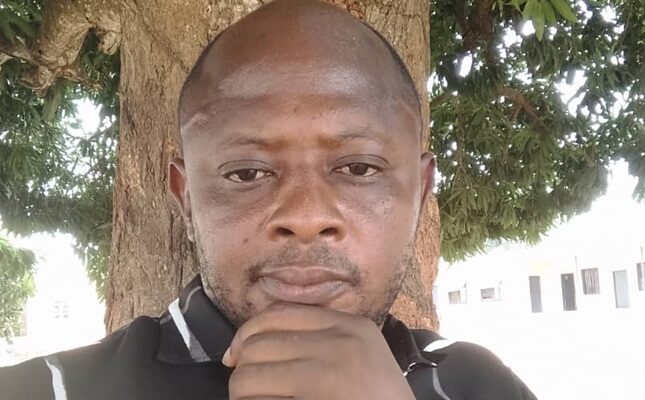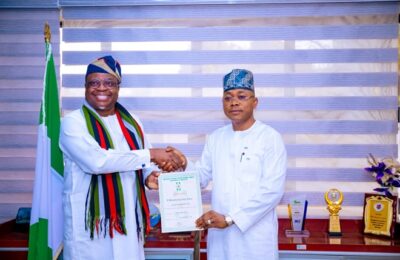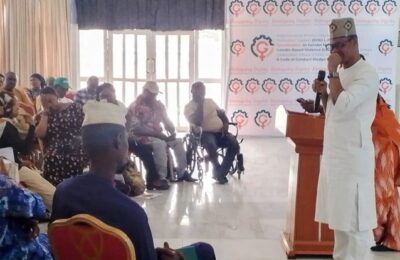Power is intoxicating. It elevates a man from the dust and sits him among princes, giving him authority over the affairs of men. But power borrowed is power uncertain, subject to the whims of those who lent it. The words of Cubana Chief Priest, though laced with street wisdom, hold a profound truth: “If they can dash you governorship, why can’t they collect it?” A man who receives his throne as a gift must remember that the hands that crowned him can just as easily dethrone him. Siminalayi Fubara, the embattled governor of Rivers State, now understands this lesson in the hardest way possible.
Like a puppet whose strings are pulled by unseen hands, Fubara ascended the seat of power under the shadow of his political benefactor, Nyesom Wike. But in the chess game of Nigerian politics, pawns do not dictate moves; they are moved. The same forces that lifted him high now conspire to bring him low. Such is the fate of those who mistake political anointment for divine ordination. “The greatest threat to freedom,” as Professor Wole Soyinka once said, “is the absence of criticism.” But in Nigeria, godfathers do not tolerate dissent. When protégés refuse to walk in their shadow, they become enemies overnight.
It is a recurring pattern in Nigerian politics. A godfather installs his candidate, expecting total submission. The protégé, intoxicated by the taste of power, begins to dream of independence. But power without a backbone is an illusion. Soon, the godfather reminds him that what was given can be taken. The will of the people? A mere formality. Elections may bring leaders to office, but it is the unseen agreements in smoky backrooms that determine who truly wields power. The people cast votes, but the godfathers cast lots. The question, then, is whether Nigeria’s democracy is truly democratic or simply a game of thrones where the highest bidder wins.
And what is seen in politics is only a mirror of what happens in spiritual circles. Many young prophets, pastors, and ministers have found themselves at the mercy of spiritual godfathers who claim to be the gatekeepers of anointing. The moment a young minister hears the call of God and seeks to walk in it, opposition rises—not from unbelievers, but from those who once mentored him. The same lips that once prayed blessings over him now utter curses. “You will never succeed in life, if disobeyed me,” they declare. Some even claim can change His mind while others feels they can “return” the anointing or “give the soul to the devil,” as though they sit in the heavens where decisions over destinies are made.
In the same way that political godfathers resist change, spiritual leaders often cling to power with an iron grip. Many refuse to be corrected, even when they err, and those who attempt to pray for them or offer counsel are branded as rebels. “The good man is the friend of all living things,” said Mahatma Gandhi, yet in the church, brotherhood is conditional. Disagree with your leader, and you may find yourself cast out like a leper, your name erased as though you never existed. Today, many would-be pastors and prophets wander, not because they lost their faith, but because they refused to bow to men who mistook themselves for gods.
True leadership, both in politics and in the church, is about legacy, not control. It is about raising men, not enslaving them. A mentor should guide, not dictate; a father should nurture, not manipulate. The measure of leadership is not in how many people bow before you, but in how many rise because of you. John C. Maxwell, the great leadership thinker, said, “A leader is one who knows the way, goes the way, and shows the way.” But in Nigeria, many godfathers, both political and spiritual, prefer to block the way. If they cannot control the journey, they would rather ensure no one moves at all.
Power is never permanent. It shifts like desert sands, blowing today in one direction and tomorrow in another. Kings fall, rulers fade, and those who once held sway become footnotes in history. Even the mighty Nebuchadnezzar, ruler of Babylon, was humbled until he acknowledged that power comes from above. “I am the Alpha and the Omega, the beginning and the end,” says the Lord. But men, in their fleeting moments of control, forget that the scepter they hold today will one day be held by another. Politics and the pulpit must learn this truth: power borrowed must be used wisely, for the day of its return always comes.
Let us keep praying—not only for politicians fighting for survival, but for ministers struggling under the weight of spiritual oppression. Let us pray for those who have been cast out, those whose voices have been silenced, those who, like Fubara, now stand at the crossroads of destiny. Power belongs to God, and no man, no matter how powerful, can change that. The hands that lift can also strike, but the hand of God, when it lifts a man, no one can bring him down.
– Inah Boniface Ocholi writes from Ayah – Igalamela/Odolu LGA, Kogi state.
08152094428 (SMS Only)




